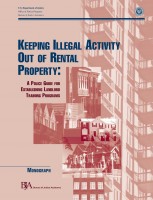It’s always heartening to see a city realizing that aggressive, not passive, code enforcement is what is necessary to protect communities. The New York City Department of Housing Preservation and Development (HPD) announced a new initiative, the Proactive Housing Preservation Initiative. The ANHD Inc. website reports:
This agency shift from its old passive method of enforcement to more aggressive monitoring of building code compliance means that housing maintenance code violations, like leaky roofs, excessive vermin, etc., should be spotted much sooner. Furthermore, outstanding violations, which often remain unfixed for extended periods of time, should be remedied much more quickly with a more aggressive HPD monitoring the landlord’s efforts to clear the violations.
The problem is that too often these initiatives come into being because the problem has gotten so bad, and the buildings so dilapidated that it’s terribly difficult to get the property rehabilitated.
There’s a very sad story about the death of a worker in New York City at a development owned by someone who keeps getting sued by the city and yet no one seems able to prevent him building shoddy structures. One quote that caught my eye was:
Spokesman Tony Sclafani said the department has no authority to deny or revoke permits based on previous safety violations or unpaid fines.
It got me wondering about whether there are jurisdictions that do have laws that deny building permits to builders who have unpaid fines or previous safety violations. I’d love to hear from someone who has such an ordinance so I can share it with the readers of this blog. I realize that builders will just incorporate under different entities to avoid such a penalty but even that could be addressed in an ordinance (e.g. based on someone’s percentage of ownership).
Large cities need to be strategic in how they use limited resources to target distressed properties. The IndyStar reports that Indianapolis has decided to concentrate its efforts by filing lawsuits against landlords who own multiple properties with high crime rates. The Fire Department said there were 90 arson fires in vacant buildings last year many set by homeless people seeking to keep warm. The local prosecutor handling the cases said that:
….. the city cross-referenced building code violations with high crime rates to prioritize which buildings and landlords to sue. Officials said rundown and unkempt buildings encourage crime.
This is a smart strategy and is most likely to lead to a decrease in crime. It’s one of the points I discuss at length when I teach my course on How Code Enforcement Effects Police Operations.
It’s always disturbing when a code enforcement action is answered with a threatened or actual lawsuit on the part of the alleged offender. Instead of focusing on the violation, everyone’s attention is taken up with the new lawsuit. If a local governmental agency is in a tough economic position, it may decide to drop the enforcement action instead of incurring legal fees to defend itself against what is usually a frivolous lawsuit. This isn’t fair to the homeowner who responds by correcting a violation or the inspector who is just doing his or her job. When politics is thrown into the mix, it can get even worse. In Camano Island, Washington, a commissioner, who was notified of a violation for building a deck without a permit and a possible wetland violation, has filed a lawsuit against the local planning director and the candidate who ran against her in an election, alleging that the code enforcement action was political in nature. Inspectors need to make sure that they keep good notes if they are placed in a situation where there is political pressure from their superiors. If an inspector feels he or she is being asked to do something that isn’t right, he or she should try to get a response in writing (e.g. e-mail) from the person applying the pressure so that there is a paper trail. That way, if there is a lawsuit filed in the matter, the inspector can show that he or she was doing an action at the direction of a supervisor. Of course, if the action is illegal, the inspector should always insist that the order is vetted by the jurisdiction’s attorney before it is implemented. If the inspector’s request for a legal review is turned down, he or she has to decide whether keeping one’s job is worth going to jail for. It’ll be interesting to see what happens in the above case. Such situations usually end up with a settlement of some type.
College towns and code violations go together like students and text books. Students seek cheap housing and are willing to live in terrible conditions if the price is right. Some landlords take advantage of this by not maintaining their buildings and others are fearful of the damage student tenants cause and are reluctant to spend money on upkeep because of that. Inspectors are usually pretty busy in areas where there are colleges and universities. A tragedy was averted when a fraternity house was shut down by the Troy Fire Department in New York after deadly levels of carbon monoxide were found. The fire department and the fraternity house are working to fix the problems before the students return. It’s imperative that college towns have an effective rental inspection program to make sure the housing meets minimum safety standards. A faithful reader points out additional fires in student rental housing in Bellingham on his website at http://www.zonemaven.blogspot.com/ I wish him luck on his attempt to get the local government to adopt such a program. Landlords will always object to the implementation of such an ordinance but the price in lives is too high not to have one.
Here’s an interesting television report regarding a landlord fined $129,000 for building code violations at a Fairfield, Ohio apartment building. http://www.wlwt.com/video/26069375/detail.html The news segment shows the deplorable conditions in the building. Such a huge fine always catches my attention. What I wonder if how often local governments actually collect the fines owed and whether the fines lead to compliance. I’d love to hear from some inspectors about their experiences with assessing large penalties and their success or failure after sentencing. I was speaking to a purchaser of distressed property today who was chuckling about a court case in a city where the corporation counsel was bragging about a $200,000 fine she had obtained against a developer. But, when the developer came to court, he said he’d declared bankruptcy, had no money to pay the fine or fix the building and was walking away from the entire mess. My caller said that the judge may as well have made the fine 2 million dollars because the person was never going to pay a cent.
Revoking a certificate of occupancy can be an important means of obtaining compliance. A strip club in Maine had its certificate of occupancy revoked recently. The Portland Press Herald said that the revocation occurred because
“of an inadequate sprinkler system and other violations.”
Prior to a certificate of occupancy being revoked, the owner/occupant is entitled to due process which means a hearing with the opportunity to be heard and a chance to present witnesses. This process is usually used after other less dramatic attempts at gaining compliance have failed, or if the danger to the public is substantial. In the guide books I have written, the Building Official and Inspector’s Guide to Codes, Forms and Complaints, the Fire Code Inspector’s Guide to Codes Forms and Complaints and the Residential Inspector’s Guide to Codes, Forms and Complaints, I have the necessary notices and appeal forms that fulfill the requirements of the model codes. It is important to follow the required steps to protect the local jurisdiction from liability.

Japan
There’s a saying that any kind of publicity is better than no publicity and I was lucky recently to be the subject of some good publicity. A local reporter called me wanting an interview about my recent work for a Japanese company. The reporter wanted to know how the internet has changed the way attorneys do business. I was pleased to tell him that one client (in Japan) found me through my blog. I wrote a paper on the effective enforcement of certain codes for the client and everything was done over the web via e-mail. This is something I never envisioned when I began my blog. It shows how universal the issues of code enforcement are throughout the world. We’re all dealing with issues of fire and safety prevention. Thankfully the United States is a leader in producing model codes due to the efforts of the International Code Council and the NFPA, among other groups. You can read the article in the Pioneer Press
.
Landlords are often concerned about damage to their properties by tenants, especially in college towns. Inspectors don’t care who caused the damage, just that repairs be made. Bill Kronstedt, a housing inspector for the City of Brainerd, Minnesota sent along information to me about a program landlords are requiring their future tenants college who are in college to attend as a condition of renting a dwelling. It’s UChoose offered by St. Cloud State University in St. Cloud, Minnesota. The program is described as:
U-Choose is an educational based campus prevention effort that focuses on the reduction of high risk
alcohol use. The program utilizes empirically based theories and approaches specifically designed for
college students.
It’s very farsighted on the part of the landlords to implement something like this before there’s trouble and I thank Bill for passing it on.

Keeping Illegal Activity Out of Rental Property
January is the time of year when I try to clean up my office at work and at home. Sometimes I come across documents that I haven’t used and referred to in 7 years and they get tossed. However, once in awhile I find something I forgot I had. This time, while cleaning up some training files, I found my copy of “Keeping Illegal Activity Out of Rental Property: A Police Guide for Establishing Landlord Training Programs” by the U.S. Department of Justice. It’s the publication used by most crime free housing programs and is available free of charge at www.ncjrs.gov/pdffiles1/bja/148656.pdf
If you’re involved in these landlord training programs or thinking about starting one, this is a great resource to have. It has a lot of useful information and I used it as my handout when I taught the legal aspects section for Carol Stream’s Apartment Community Enhancement program. Even if you don’t have the program, it has great ideas to share with landlords whether you’re an inspector or a police officer.



